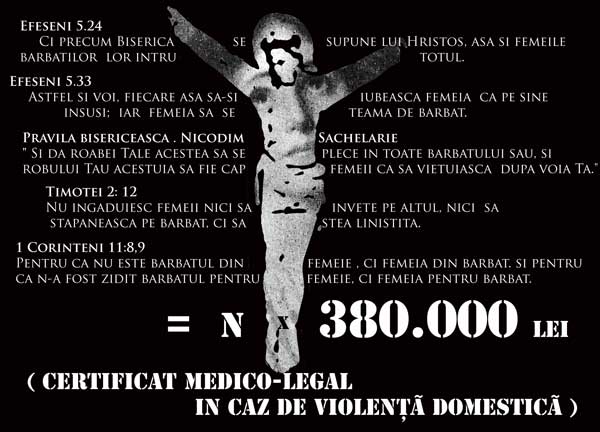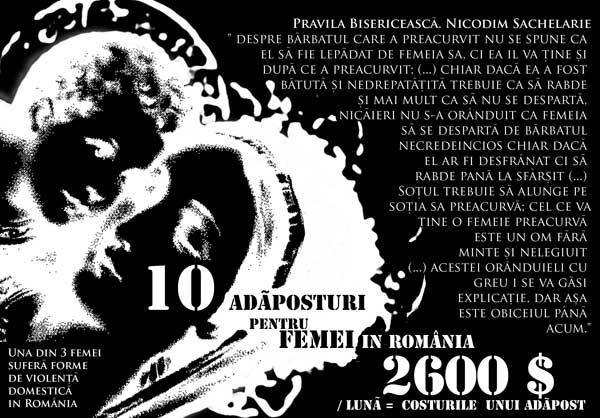Imagini de Nita Mocanu si Hajni Bessenyei
pentru proiectul “Laicitate si Complicitate” (Costinas, Torday, Ernu)
Category Archives: sexuality
[zina lf-ro’05] despre protestul ei…
In anii ’60-’70 au existat o serie de grupari care au reinceput sa militeze pentru drepturile femeilor. Femeile si-au dat seama ca doar dreptul la vot nu asigura egalitatea. S-au pus bazele multor legislatii si organizatii (numai daca ne gandim la legile din domeniul violentei impotriva femeilor, asigurarea sanselor egale pe piata muncii si in educatie). A fost din multe puncte de vedere o evolutie spectaculoasa. A fost si perioada marilor proteste. Intre timp s-a evoluat. Dar s-a schimbat si campul de lupta: din strada unde erau cereri clare (considerate a fi radicale) s-a trecut la masa negocierilor si la parteneriate de tip public-privat.
Putem vorbi de o evolutie? Raspunsul este greu de dat. Voi veni cu un exemplu al unei miscari si al unei feministe socialiste asupra careia eu am reflectat in ultimul timp.
Maria Rosa Dalla Costa a “crescut” in miscarea Operaio Potere, din Italia, din anii ’70, miscare care se opunea capitalismului. Dupa aproximativ un an, impreuna cu un alt grup de femei au format miscarea activista Lotta Femminista. Miscarea a pus problema muncii casnice, violentei, drepturilor reproductive, sexulitatii, etc..
Continue reading
[zina lf-ro’05] The ghost in the shell
Emma Goldman spunea ca doar femeile insele se pot elibera de opresia lor “interioara”. (in “Living my life”)
Cred ca multe femei nu iau in considerare ca aceasta opresie exista. Personal ma intalnesc cu foarte multe femei care considera ca eu exagerez vorbind despre feminism si lupta impotriva sexismului si a patriarhatului, ce sa mai spun despre abolirea capitalismului si exploatarii.
Si de fapt ce inseamna opresia “interioara”?
Mai intai, trebuie sa te descoperi pe tine ca femeie in interiorul tau, privindu-te cu ochii tai, si nu prin filtrul moralitatii si al culturii in care traiesti, nu prin intermediul mediei mainstream (TV sau cinematograf) si bineinteles nu prin ochii barbatilor; un exercitiu destul de greu de realizat pentru mine personal.
[zina lf-ro’05] o femeie tolerata si toleranta
Un protagonist masculin al autorului pentru care anul 2000 a fost religios (caci a fost!) declara la un moment dat in firul epic ca resimte orgoliu. Nu neaparat orgoliul de a fi barbat cat orgoliul de a NU fi femeie. Contextul era acela creat de frecventarea prostituatelor. O aidoma senzatie de dezgust mi-a creat replica, incat am retinut-o drept jignirea la care eu as fi rezonat cel mai profund ranita.
Daca replica aceea a pornit din rarunchii unei realitati acceptate de majoritatea barbatilor, atunci deodata intervine un cuvant-cheie ce m-ar defini: “tolerata”. Tolerata si toleranta deopotriva, din moment ce a accepta apelativul de “tolerata” suna echivalent cu a-ti asuma un ipotetic statut servil fata de o realitate intangibila tie.
Continue reading
[zina lf-ro’05] feminism reformulat ca anti-sexism?
Imparteam recent o vana de apa calda cu boifrendul meu discutand despre feminism si toate acele practici de fiecare zi peste care trecem fara sa ne gandim la ele, dar care, cu o lupa feminista, ar scoate in evidenta sexismul inradacinat in fiecare dintre noi. Spre exemplu atunci cand mergand pe strada cu un barbat mi se intampla ca alte cunostinte barbati sa ne salute, sa isi dea mana, sa intre in discutie, lasandu-ma in afara momentului social. Şi nu este atat ramanerea in afara discutiei problema, cat faptul ca acesteia nu ii este acordata nici o atentie, faptul ca acestor doi barbati nici macar nu le trece prin minte ca ar putea fi deranjant modul in care interactioneaza in prezenta si a mea. Sau sexismul din afirmatia ca barbatii sunt misogini, sau insensibili, sau cu totii la fel, [sigh].
Continue reading
subtle, sister
…”i don’t get a lot of your references, ’cause we don’t have sexism in our country”
…i think this is my most subtle work to date.
versuri
alix olson
[despre slam poetry: “One of the most vital and energetic movements in poetry during the 1990s, slam has revitalized interest in poetry in performance. Poetry began as part of an oral tradition, and movements like the Beats and the poets of Negritude were devoted to the spoken and performed aspects of their poems. This interest was reborn through the rise of poetry slams across America; while many poets in academia found fault with the movement, slam was well received among young poets and poets of diverse backgrounds as a democratizing force. This generation of spoken word poetry is often highly politicized, drawing upon racial, economic, and gender injustices as well as current events for subject manner.”
mai multe: The Academy of American Poets – A Brief Guide to Slam Poetry]
alti “slam poets”: staceyann chin | suheir hammad | saul williams
util
completeaza ca sa afli de cite tratamente ai nevoie: :)
water massage treatment
for hysteria cca 1860.
e foarte important [pt. localizarea uterului – posibil s-o fi luat-o iar la plimbare, vezi.]!
sau citind-o pe jessica de la feministing,
“You can see just how many leeches on your vag you’ll need to cure you of your love of reading and bike-riding. Fun!”
en.wikipedia.org/wiki/Hysteria
ISTERÍE s.f. Boală nervoasă manifestată prin tulburări ale sensibilităţii, prin convulsii etc., nejustificate de existenţa unor leziuni. [Gen. -iei, var. histerie s.f. / cf. fr. hystérie < gr. hystera – uter]. Continue reading
Helping Women Who Sell Sex: The Construction of Benevolent Identities
Abstract: Social interventions aimed at helping the group positioned as most needy in Europe today, migrant women who sell sex, can be understood by examining that time, 200 years ago, when ‘the prostitute’ was identified as needing to be saved. Before, there was no class of people who viewed their mission to be ‘helping’ working-class women who sold sex, but, during the ‘rise of the social,’ the figure of the ‘prostitute’ as pathetic victim came to dominate all other images. At the same time, demographic changes meant that many women needed and wanted to earn money and independence, yet no professions thought respectable were open to them. Simultaneous with the creation of the prostitute-victim, middle class women were identified as peculiarly capable of raising them up and showing the way to domesticity. These ‘helpers’ constructed a new identity and occupational sphere for themselves, one considered worthy and even prestigious. Nowadays, to question ‘helping’ projects often causes anger or dismissal. A genealogical approach, which shows how governmentality functioned in the past, is easier to accept, and may facilitate the taking of a reflexive attitude in the present.
despre intersectia feminism-critica nationalismului
o foarte buna sinteza a raspunsului la intrebarea de ce nationalismul este un subiect relevant pentru feminism si viceversa (de thinking girl) [en]
… Nationalism is replacing democracy. Nationalism … is a disguised form of racism, and democracy becomes a tool for nationalist racism to flourish through “freedom of speech” that allows freely spoken hatred – this “freedom” is a freedom of the speaker, not a freedom of those spoken about. When nationalism creates images and rhetoric of homogeneity in its population, marginalizing on the basis of race, gender, and sexuality, the freedom of marginalized groups to speak back against hate speech with speech of their own is compromised, because their speech is not as powerful and valuable as that of the dominant group. Hate speech is one-sided; how is that “freedom”? “equality”? Outsiders in a nation cannot use freedom of speech to challenge the inside ofthat nation; their speech is rejected.
Language about nations is largely highly gendered. We talk about the “mother” or “fatherland”, the “mothertongue.” Nationalism is often spoken in terms of family, headed by a masculine figure, and embodied as a woman. The patriarchal family unit is privileged in nationalistic discourses. The feminine is mother, nurturer, caregiver, in this family, and so the nation’s women are mothers of all the children of the nation. This makes women particular targets in ethnic cleansing regimes as warring groups rape and impregnate women, forcing them to literally be the mothers of a new fantasmic nation of their own design. The women themselves get lost in these violent acts; ethnic cleansing/genocidal rape is seen as worse than “regular” rape, partially because the crime has men as the intended victims as well as the raped women: genocidal rape is meant to eliminate a population of people, not just eliminate the woman. And here, of course, “people” includes the most important citizens: male citizens. At the same time that victims of genocidal rape are forced to be mothers to a new nation, they are eliminated as the mothers of the old nation, used to break apart the national family. And this fiction is legitimized along racial lines but it plays out on gender lines, normalizing gender violence by leaving it unnamed. Male-male rape in war is not mentioned because it destabilizes the very idea of gender central to nationalism. And, of course, in all of this ideology about the patriarchal family unit, gay, lesbian, bisexual, and trans people are completely invisible, because sexuality is invisible…
iubire maximala
ia sa vedem. ma framinta la maxim, oare eu cit de “iubita pot sa fiu”?
Iubim femeile pentru ca au sani rotunzi, cu gurguie care se ridica prin bluza cand le e frig…
ok. pentru cei care nu stiu, insa, majoritatea femeilor nu au sini rotunzi.
…pentru ca au fundul mare si grasut, pentru ca au fete cu trasaturi dulci ca ale copiilor, pentru ca au buze pline, dinti decenti si limbi de care nu ti-e sila.
ca ale copiilor. hmmm…
Pentru ca nu miros a transpiratie sau a tutun prost si nu asuda pe buza superioara.
eu transpir pe buza superioara. cu cit e mai cald, cu atit mai mult. femeile sint oameni. oamenii transpira.
Pentru ca le zambesc tuturor copiilor mici care trec pe langa ele.
eu da, dar de fapt sint o exceptie printre prietenele mele apropiate.
Pentru ca merg pe strada drepte, cu capul sus, cu umerii trasi inapoi si nu raspund privirii tale cand le fixezi ca un maniac.
hm, oare de ce fac asta majoritatea femeilor? probabil pt. ca le place atit de mult cind “le fixezi ca un maniac”. eu personal “raspund” privirilor respective cu o incruntare sau citeva cuvinte ne-maniace dar ne-dulci.
Pentru ca trec cu un curaj neasteptat peste toate servitutile anatomiei lor delicate.
care anatomie delicata? anatomia mea nu e “delicata”. am probleme cu ea, insa ma astept sa am curaj – nu stiu de ce ar mira pe cineva ca am curaj.
Pentru ca in pat sunt indraznete si inventive nu din perversitate, ci ca sa-ti arate ca te iubesc.
da? sigur nu pentru ca vor sa simta placere si satisfactie, ca orice om?
Pentru ca fac toate treburile sacaitoare si marunte din casa fara sa se laude cu asta si fara sa ceara recunostinta.
eu nu fac toate treburile, dar cind fac ceva chiar ma laud si astept recunostinta din partea altora.
Pentru ca nu citesc reviste porno si nu navigheaza pe site-uri porno.




